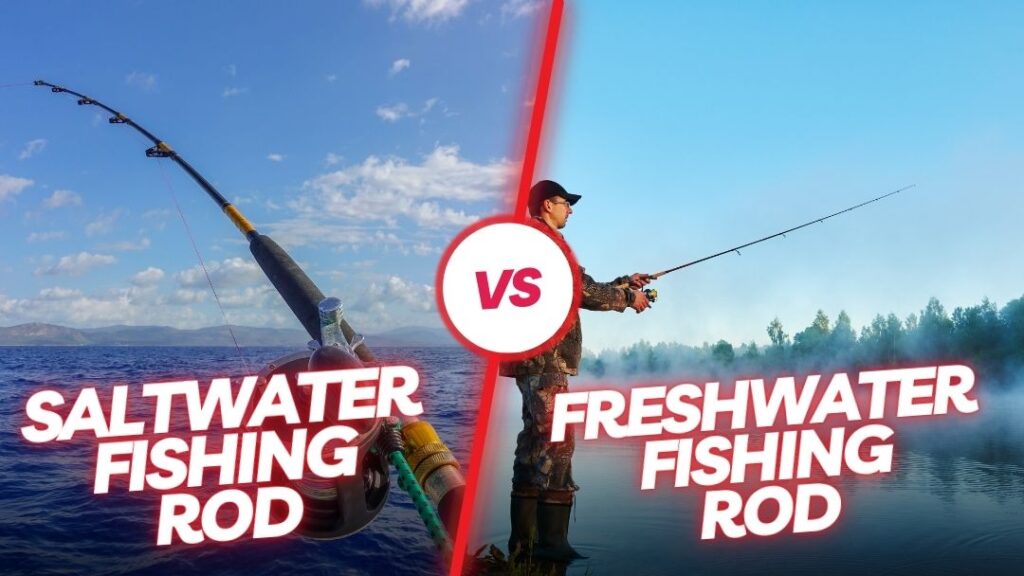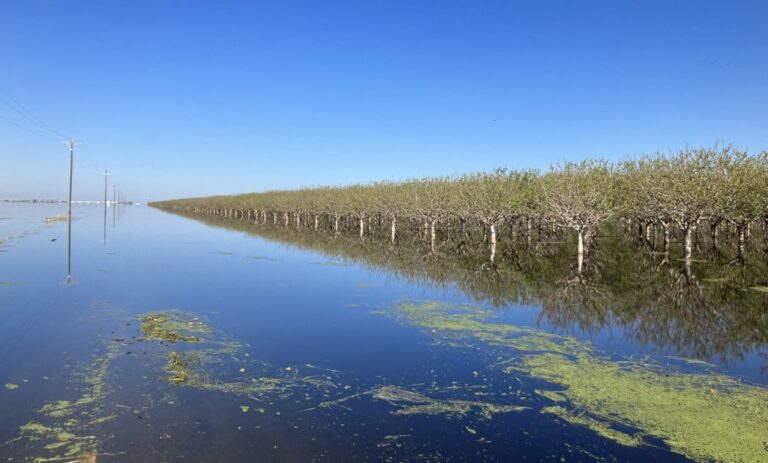Saltwater Vs Freshwater Fishing Rods: What to Know Before You Cast Off!
Saltwater and freshwater fishing rods differ in their construction and durability, specifically designed to withstand the unique challenges posed by different environments.
In saltwater, rods need to be more resistant to corrosion and have a higher power rating to handle larger and more aggressive fish, while freshwater rods prioritize sensitivity and finesse for smaller species.
Understanding these differences is crucial for choosing the right fishing rod for your desired fishing experience. So, whether you’re planning a saltwater adventure or fishing in your local freshwater lake, it’s essential to know what sets these rods apart and what to consider when making a purchase.
This article will provide you with the information you need to make an informed decision and ensure a successful fishing trip.
Different Types Of Fishing Rods
When it comes to fishing, using the right fishing rod can make all the difference in your success on the water. Different types of fishing rods are designed to meet the specific demands of various fishing environments, such as saltwater and freshwater.
Spinning Rods
Spinning rods are undoubtedly the most versatile and widely used fishing rods in both saltwater and freshwater environments. Known for their user-friendly design, spinning rods are perfect for beginners and experienced anglers alike.
One of the main advantages of a spinning rod is its spinning reel, which hangs beneath the rod instead of being mounted on top. This design allows for easy and quick casting, making it suitable for various fishing techniques such as casting lures, using live bait, or drop-shotting.
Spinning rods are also known for their flexibility in handling different types of fishing lines, including monofilament, fluorocarbon, and braided lines. These rods have guides along the underside, which helps reduce friction and prevent line tangles.
Moreover, spinning rods come in various lengths and power ratings, allowing anglers to choose the right rod based on their targeted fish species and fishing conditions.
Baitcasting Rods
Unlike spinning rods, baitcasting rods are designed specifically for experienced anglers who demand greater accuracy and control in their fishing technique.
These rods feature a reel mounted on top of the rod and are typically used for heavier lures and lines. Baitcasting rods offer enhanced casting distance and better line control, making them ideal for precision fishing and targeting larger fish species.
One of the notable features of baitcasting rods is their ability to handle heavier fishing lines effectively. They have a tighter grip on the line spool, minimizing line slippage during the cast. This design allows anglers to cast their bait or lures with more accuracy and control the line tension more effectively.
Fly Rods
Fly fishing is a unique fishing technique that requires specialized gear, including fly rods. These rods are specifically designed to cast the lightweight artificial fly instead of using weighted lures or bait. Fly rods vary based on different factors like fly line weight, rod length, and rod action.
In saltwater fishing, fly rods are typically longer and sturdier to handle larger fish species and challenging weather conditions. On the other hand, freshwater fly rods tend to be lighter and more flexible, emphasizing delicate presentations and accuracy. The action of the fly rod determines its flexibility and stiffness, affecting the casting distance and accuracy as well.
It’s worth noting that while the basic design of fly rods remains the same, their materials and technology continue to evolve. Manufacturers often tailor fly rods to meet the specific demands of saltwater and freshwater environments, ensuring anglers have the appropriate tools for their fishing needs.
| Type | Suitable Environments | Main Advantages |
|---|---|---|
| Spinning Rods | Saltwater and Freshwater | Versatile and easy to use |
| Baitcasting Rods | Saltwater and Freshwater | Offers better accuracy and control |
| Fly Rods | Saltwater and Freshwater | Specifically designed for fly fishing |
Considerations For Saltwater Fishing Rods
When it comes to saltwater fishing, having the right equipment is essential for a successful and enjoyable fishing experience. One crucial piece of equipment that every angler needs to consider is the fishing rod.
Saltwater fishing rods differ from their freshwater counterparts in various ways, and understanding these differences is key to making an informed decision.

Rod Material And Construction
The material and construction of a saltwater fishing rod play a significant role in its performance and durability. Since saltwater environments can be harsh and corrosive, it is crucial to choose rods made from corrosion-resistant materials.
Corrosion-resistant materials for saltwater environments
When fishing in saltwater, your rod will be exposed to the corrosive effects of salt and water. To combat this, look for rods made from materials like graphite or composite materials. These materials offer excellent corrosion resistance while maintaining strength and sensitivity.
Reinforced construction for increased durability
Compared to freshwater fishing, saltwater fishing often involves larger and more powerful fish. Therefore, saltwater rods require a reinforced construction to handle the increased pressure and stress. Look for rods that feature reinforced blanks and sturdy guides to prevent them from bending or breaking under the strain of fighting a strong saltwater species.
Rod Length And Power
The length and power of a fishing rod are important considerations when fishing in saltwater. Choosing the right combination can greatly enhance your casting distance, leverage, and ability to handle larger fish species.
Longer rods for casting distance and leverage
In saltwater fishing, longer rods are preferred as they provide increased casting distance. The longer length allows for longer and more accurate casts, enabling you to cover more water and reach fish that may be lurking further out. Additionally, longer rods provide more leverage when fighting larger fish, helping you to exert greater control and land your catch with ease.
Stronger power for handling larger saltwater species
When targeting saltwater species, such as marlin, tuna, or tarpon, it is important to choose a rod with a higher power rating. The power of a rod refers to its ability to handle different fish sizes and weights. Opting for a rod with a stronger power rating ensures that you have the necessary strength to handle the big fish that saltwater fishing often brings.
Line Guides And Reel Seats
The line guides and reel seats on a saltwater fishing rod also need special consideration due to the corrosive nature of the saltwater environment.
Sealed or coated guides to prevent saltwater damage
Saltwater can cause significant damage to the guides on a fishing rod, affecting both the line performance and the rod’s overall lifespan. To prevent this, look for rods with sealed or coated guides. These features help to protect the interior parts of the guides from saltwater intrusion, ensuring smooth line flow and reducing the risk of guide failure.
Sturdy reel seats for secure reel attachment
Attaching your reel securely to the rod is crucial in saltwater fishing, as constant exposure to saltwater can loosen or corrode the reel seat. Look for rods with sturdy reel seats, preferably made from robust materials such as stainless steel or aluminum. A strong reel seat not only provides a secure attachment for your reel but also helps maintain the overall integrity of the rod.
Factors To Keep In Mind For Freshwater Fishing Rods
Freshwater fishing rods are essential tools for any angler looking to enjoy a day on the lake or river. They come in a variety of styles and designs, each tailored to specific fishing techniques and target species.
When it comes to choosing the right freshwater fishing rod, there are several factors to keep in mind to ensure an optimal fishing experience.
Rod Sensitivity And Action
One of the most important factors to consider when choosing a freshwater fishing rod is its sensitivity and action. Rod sensitivity refers to how well the rod can transmit vibrations from the line to the angler’s hand.
A more sensitive rod allows anglers to feel even the slightest nibble or bite, increasing their chances of detecting and hooking fish.
Rod action, on the other hand, refers to the flexibility and bend of the rod. Different fishing techniques require different rod actions. For instance, a fast or extra-fast action rod is ideal for techniques that require quick and powerful hooksets, such as jigging or topwater fishing.
On the other hand, a slow or moderate action rod provides a more forgiving bend, making it suitable for techniques that require finesse and delicate presentations, such as drop-shotting or live bait fishing.
Lighter Rods For Detecting Subtle Bites In Freshwater
In freshwater fishing, many species tend to exhibit subtle bites or nibbles, making it crucial to have a rod that can detect these delicate movements.
Lighter rods not only enhance sensitivity but also minimize the risk of fish feeling resistance and spitting out the bait. Investing in a lightweight freshwater fishing rod can significantly improve your chances of landing more fish.
Different Actions For Various Fishing Techniques
Various fishing techniques require specific rod actions to achieve optimal performance. For example, flipping and pitching techniques necessitate a heavy or extra-heavy power rod with fast action, providing anglers with the necessary strength and precision for accurately casting heavy lures into tight covers.
In contrast, finesse fishing techniques, such as using light lines and small baits, call for a rod with a slower action to ensure a gentle presentation and increase the likelihood of getting a bite.
Rod Weight And Balance
The weight and balance of a fishing rod play a crucial role in the angler’s comfort and overall fishing experience. Lighter-weight rods are particularly advantageous for reducing fatigue during long fishing sessions, allowing anglers to cast and retrieve without straining their muscles.
Additionally, a well-balanced rod provides better control and casting accuracy, enhancing the angler’s ability to present lures precisely where fish are likely to be lurking.
Target Species And Fishing Technique
When selecting a freshwater fishing rod, it’s essential to consider the target species and the fishing technique you plan to employ. Different rods are designed to handle specific fish species and techniques.
For instance, bass fishing often requires medium to medium-heavy power rods with fast to extra-fast actions to handle the aggressive strikes and strong fights of these powerful fish. On the other hand, trout fishing may call for lighter rods with slower actions to cater to the delicate nature of these fish and the finesse tactics commonly used.
Furthermore, specialized rods are available for specific techniques, such as finesse fishing for highly pressured fish. These finesse rods are typically light and have a slow to moderate action, giving anglers better control and sensitivity when using light lines and small baits in challenging conditions.
By considering the factors mentioned above when selecting a freshwater fishing rod, you can ensure that you choose a rod that is well-suited for your fishing style and target species. Remember, the right rod can make a significant difference in your fishing success and overall enjoyment on the water.
Key Differences Between Saltwater And Freshwater Fishing Rods
Fishing enthusiasts are well aware that the type of fishing rod you choose can greatly impact your fishing experience. Whether you’re planning to venture into saltwater or freshwater fishing, it’s crucial to understand the key differences between the two types of rods.
From durability and maintenance to corrosion resistance and the handling of larger fish, each category boasts unique features that cater to specific fishing environments.
Rod Durability And Maintenance
Ensuring the durability and maintenance of your fishing rod is crucial to its lifespan and performance in the long run. Saltwater and freshwater fishing rods differ significantly in this aspect.
Saltwater rods require more care and maintenance
Saltwater rods are exposed to a more corrosive environment due to the high salt content that can potentially damage the rod’s components. Therefore, saltwater rods demand more attention and maintenance to prevent corrosion and ensure their longevity. Regular rinsing, cleaning, and proper storage after each use are essential to keep your saltwater rod in top shape.
Freshwater rods are generally easier to maintain
On the other hand, freshwater rods are subject to less exposure to corrosive elements. This makes them relatively easier to maintain compared to their saltwater counterparts. While freshwater rods still require routine cleaning and proper storage, they are less prone to corrosion, allowing for a simpler maintenance routine.
Corrosion Resistance And Environmental Factors
The susceptibility to corrosion is a key consideration when choosing between saltwater and freshwater fishing rods. Understanding the environmental factors and the level of corrosion resistance required by each type of rod is essential to make an informed decision.
Saltwater rods need corrosion-resistant materials
Given the aggressive saltwater environment, saltwater rods are constructed using corrosion-resistant materials such as stainless steel or specialized coatings. These materials help withstand the corrosive effects of saltwater, ensuring the longevity of the rod components even in challenging conditions.
Freshwater rods are less exposed to corrosive elements
Since freshwater fishing takes place in non-saline environments, freshwater rods are less exposed to corrosive elements. As a result, these rods generally do not require the same level of corrosion-resistant materials as saltwater rods. However, it is still important to choose a rod made of high-quality materials that can withstand the rigors of freshwater fishing.
Handling Larger Fish And Casting Distance
The ability to handle larger fish and achieve longer casting distances are vital factors to consider when selecting a fishing rod. Saltwater and freshwater rods offer distinct advantages in these areas.
Saltwater rods are designed to handle bigger, stronger fish
Saltwater fishing often involves dealing with larger and more powerful fish species. Therefore, saltwater rods are engineered to provide the necessary strength and power required to handle the force exerted by these marine creatures. These rods are often sturdier, with increased backbone and lifting power, allowing anglers to successfully reel in bigger catches.
Freshwater rods focus more on precision and accuracy
While freshwater fish may not typically match the size and strength of their saltwater counterparts, freshwater rods excel in terms of precision and accuracy. These rods are designed to allow for more delicate presentations and precise casts, enhancing the angler’s ability to target specific areas and lure fish with more finesse.
Finding The Right Rod For Your Fishing Needs
When it comes to fishing, having the right rod can make all the difference. Whether you’re a seasoned angler or just starting, it’s important to choose a fishing rod that suits your needs and preferences.
From considering your fishing location and target species to assessing your fishing style and experience level, there are several factors to take into account.
Consider your fishing location and target species
The first step in finding the right fishing rod is to consider the location where you fish and the species you target. Whether you prefer saltwater or freshwater fishing can greatly influence your rod selection.
- Saltwater Fishing: If you mostly fish in saltwater environments, you’ll need a rod that can withstand the corrosive nature of saltwater. Saltwater rods are designed to be more rugged and capable of handling larger fish species found in these environments.
- Freshwater Fishing: On the other hand, if you primarily fish in freshwater lakes or rivers, a rod designed specifically for freshwater fishing will suffice. These rods are typically lighter in weight and more sensitive, which allows for better control when targeting smaller fish species.
Identify the size and type of fish you typically target
The size and type of fish you usually target will play a significant role in determining the appropriate rod. Different fish species require different rod specifications.
- Small Fish Species: If you typically target smaller fish species like trout or bass, a light or medium-light rod would be suitable. These rods offer more flexibility and sensitivity, allowing you to feel even the faintest nibble.
- Medium Fish Species: For medium-sized fish like walleye or snook, a medium or medium-heavy rod is recommended. These rods provide enough strength and power to handle the fight while still maintaining good sensitivity.
- Large Fish Species: If you’re targeting larger fish like tarpon or marlin, a heavy or extra-heavy rod is essential. These rods have the backbone to handle the weight and power of these fish, giving you more control during the battle.
Assess your fishing style and experience level
Understanding your fishing style and experience level is crucial in finding a rod that suits your needs.
- Casting vs. Spinning: Consider whether you prefer casting or spinning reels. Casting rods are designed for bait caster reels and are better suited for precise casting while spinning rods are designed for spinning reels and offer easier control for beginners.
- Beginner vs. Advanced: If you’re a beginner, it’s recommended to start with a rod that has moderate action. This will provide a good balance of flexibility and strength, making it easier to handle and control. Experienced anglers can opt for rods with fast or extra-fast action, which offer a quicker response and greater sensitivity.
Choose a rod that matches your preferred fishing techniques
Different fishing techniques require different rod characteristics. Consider the techniques you enjoy using the most and choose a rod that complements them.
- Casting: If you prefer casting techniques such as flipping, pitching, or crankbaiting, choose a rod with a more flexible tip to allow for accurate and controlled casting.
- Trolling: For trolling techniques, a rod with moderate action and a strong backbone is ideal. This allows for better control and hook-setting power when the fish strikes.
- Fly Fishing: If you’re into fly fishing, invest in a specialized fly fishing rod and reel combo. These rods have a flexible action to cast the fly line smoothly and accurately.
Consider your skill level to find a rod that suits your abilities
It’s important to choose a fishing rod that matches your skill level and abilities. This will help optimize your fishing experience and ensure you can handle the rod properly.
- Beginners: For novice anglers, a rod with a slower action and forgiving nature is recommended. This allows for more control and forgiveness in timing and casting accuracy.
- Intermediate to Advanced: Anglers with more experience can opt for rods with faster actions. These rods offer more sensitivity, power, and responsiveness to your movements, enabling you to make more precise casts and detect subtle bites.
Set a budget and consider rod features
Finally, determining your budget range for purchasing a fishing rod is essential. Once you have a budget in mind, research different rod features and choose the ones that fit your needs.
- Material: Rods can be made from various materials like fiberglass, graphite, or a combination of both. Each material has its own advantages and disadvantages in terms of durability, weight, and sensitivity.
- Rod Length: Consider the length of the rod based on your fishing style and the environment you fish in. Longer rods provide better casting distance, while shorter rods offer more control in tight spaces.
- Power and Action: Power refers to the rod’s strength, while action refers to the flexibility of the rod’s tip. Finding the right balance of power and action is crucial in optimizing your fishing experience.
Finding the right fishing rod for your needs may seem like a daunting task, but by considering your fishing location, target species, fish size, fishing style, experience level, and budget, you can make an informed choice.
Remember, the perfect rod is the one that feels comfortable in your hands and complements your fishing style and preferences. Happy fishing!
Conclusion
Choosing the right fishing rod, whether for saltwater or freshwater, is crucial to maximize your fishing experience.
Understanding the key differences between the two will help you make an informed decision. Saltwater rods are designed to withstand the harsh conditions of the ocean, while freshwater rods are lighter and more flexible for smaller species.
Consider your fishing environment and target species to select the appropriate rod. Happy fishing!





